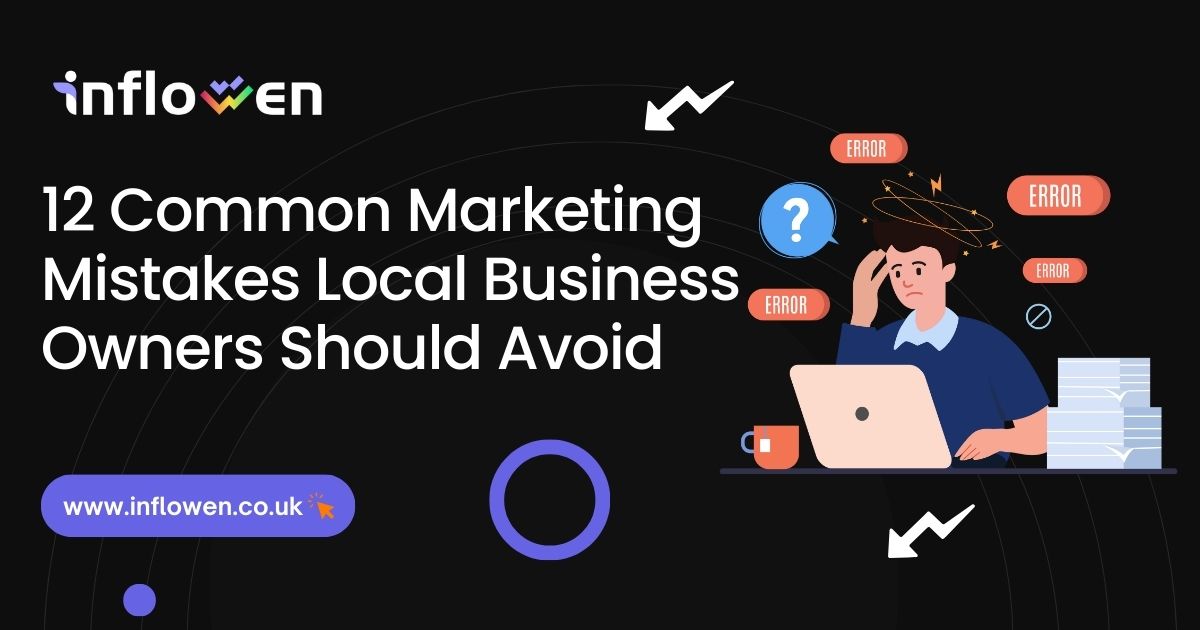Local business owners often face numerous marketing challenges that can significantly impact their success. Understanding and addressing common marketing mistakes is crucial, as research indicates that nearly 20% of small businesses fail within their first year, with about 50% succumbing to failure within five years due to poor marketing strategies.
The following sections will highlight 12 critical marketing mistakes local businesses should avoid, alongside strategies to prevent them. By recognising these pitfalls and implementing effective solutions, owners can enhance their marketing effectiveness and overall business sustainability.
Key Marketing Mistakes to Avoid:
- Do not create a Business Plan
- Not Knowing Your Target Customers
- Forgetting to Set Goals
- Neglecting Marketing
- Not Investing in Organic Marketing
- Poor Financial Management
- Trying to Do It All by Yourself
- Not Prioritizing Customer Service
- Not Validating Your Business Idea
- Expanding Your Budget Too Fast
- Making Unnecessary Investments
- Losing Focus
Table of Contents
1. Do not Create a Business Plan
A business plan serves as a roadmap for your marketing strategies and overall business direction. Many local business owners need to pay more attention to this crucial step, resulting in a lack of clear objectives and focus. With a well-defined plan, marketing efforts can be more organized and effective, leading to wasted resources and missed opportunities.
To avoid this mistake, it’s essential to create a detailed business plan that outlines your goals, target audience, and marketing strategies. Key points to consider include:
- Conducting thorough market research to understand industry trends.
- Setting specific, measurable objectives for your marketing efforts.
- Regularly revisiting and updating your business plan to adapt to changing circumstances.
- Allocating a budget that aligns with your marketing initiatives.
By having a solid business plan in place, you can steer your marketing efforts in a focused direction and measure success effectively.
2. Not Knowing Your Target Customers
Understanding your target customers is crucial for effective marketing. Many local business owners fail to identify who their ideal customers are, resulting in marketing campaigns that do not resonate with the audience. This oversight can lead to low engagement rates and ultimately hurt sales.
To avoid this mistake, invest time in market research to define your target audience. Focus on gathering insights about their demographics, preferences, and pain points. Implement the following strategies:
- Develop customer personas to visualize and understand your audience better.
- Conduct surveys or interviews to gain direct feedback from potential customers.
- Use analytics tools to track customer behaviour and adjust your marketing strategies accordingly.
By knowing your target customers, you can tailor your marketing messages to meet their needs, leading to more effective campaigns.
3. Forgetting to Set Goals
Setting clear marketing goals is essential for guiding your efforts and measuring success. However, many local business owners overlook this critical step, resulting in unfocused marketing initiatives. Without specific goals, it becomes challenging to evaluate the effectiveness of your strategies, which can lead to wasted time and resources.
To avoid this mistake, establish SMART (Specific, Measurable, Achievable, Relevant, Time-bound) goals for your marketing campaigns. This structured approach will help you stay focused and accountable. Key actions include:
- Breaking down larger goals into smaller, actionable tasks.
- Regularly reviewing your goals to ensure they remain relevant and achievable.
- Celebrating milestones to maintain motivation and track progress.
By setting clear goals, you can direct your marketing efforts more effectively and assess the impact of your strategies.
4. Neglecting Marketing
Marketing is an essential component of business success, yet many local business owners underestimate its importance. Neglecting marketing efforts can result in a lack of visibility and stagnation in customer acquisition. This mistake often leads to dwindling sales and a weakened brand presence in the market.
Prioritise marketing as a key function within your business. Develop a marketing calendar to plan and execute your campaigns systematically. Consider these strategies:
- Allocate a dedicated budget for marketing activities.
- Leverage digital marketing channels, such as social media and email marketing, for outreach.
- Regularly evaluate your marketing performance and adjust your strategies based on results.
By treating marketing as a priority, you can ensure consistent engagement with your audience and drive business growth.
5. Not Investing in Organic Marketing
Many local business owners overlook organic marketing methods, such as search engine optimisation (SEO) and content marketing, in favour of paid advertising. This oversight can lead to high marketing costs without sustainable returns. Organic marketing strategies build long-term relationships with customers and improve brand visibility over time.
Incorporate organic marketing strategies into your overall plan. Focus on creating high-quality content that resonates with your audience. Implement the following approaches:
- Optimise your website for search engines to improve visibility in search results.
- Create valuable content, such as blog posts or videos, to engage and educate your audience.
- Build a strong social media presence to connect with customers authentically.
By investing in organic marketing, you can create a sustainable growth strategy that drives long-term success.
6. Poor Financial Management
Effective financial management is critical for sustaining marketing efforts and overall business viability. Local business owners often struggle with budgeting for marketing initiatives, leading to overspending or inadequate funding for essential campaigns. Poor financial decisions can quickly jeopardise a business’s success.
Create a detailed budget that includes all marketing expenses. Regularly review your financial statements to monitor spending and ensure alignment with your goals. Consider the following points:
- Use accounting software to track marketing expenditures.
- Set aside a contingency fund for unexpected marketing costs.
- Regularly reassess your budget to adjust for changes in the market and business needs.
By managing your finances effectively, you can ensure that your marketing efforts are well-supported and sustainable.
7. Trying to Do It All by Yourself
Many local business owners feel the need to manage every aspect of their marketing independently. This approach can lead to burnout and suboptimal results, as owners may lack the expertise needed for effective marketing. Attempting to juggle too many responsibilities often results in overlooked opportunities and decreased quality of work.
Consider delegating marketing tasks to professionals or hiring experts. Collaborating with marketing agencies or freelancers can provide valuable insights and relieve some of the burdens. Focus on these strategies:
- Identify your strengths and weaknesses in marketing.
- Seek assistance for areas where you lack expertise.
- Invest in training or workshops to enhance your marketing knowledge.
By leveraging external expertise, you can improve your marketing efforts while focusing on other critical aspects of your business.
8. Not Prioritizing Customer Service
Customer service is integral to marketing and plays a vital role in building brand loyalty. Many local business owners fail to prioritise customer satisfaction, resulting in negative reviews and a damaged reputation. This oversight can lead to lost sales and decreased customer retention.
Integrate exceptional customer service into your marketing strategy. Ensure that your team is well-trained to handle inquiries and complaints effectively. Consider the following actions:
- Establish clear communication channels for customer support.
- Collect and act on customer feedback to improve your services.
- Create loyalty programs to reward repeat customers and enhance their experience.
By prioritising customer service, you can foster positive relationships with your customers, ultimately leading to increased sales and brand loyalty.
9. Not Validating Your Business Idea
Before launching a product or service, it’s essential to validate your business idea. Many local business owners skip this critical step, resulting in offerings that do not meet market demand. This oversight can lead to wasted resources and potential failure.
To avoid this mistake, conduct market testing before fully launching your product or service. Gather feedback from potential customers to understand their needs and preferences. Employ these strategies:
- Use surveys or focus groups to gauge interest and gather insights.
- Launch a pilot version of your product to test the waters and gather feedback.
- Adjust your offerings based on customer responses and market demands.
By validating your business idea, you can ensure that your offerings align with customer expectations and increase the likelihood of success.
10. Expanding Your Budget Too Fast
While investing in growth is essential, expanding your marketing budget too quickly can lead to financial strain. Many local business owners feel pressured to scale operations without adequate planning, resulting in overspending without guaranteed returns.
Scale your budget gradually based on proven success. Monitor your marketing performance before increasing your spending. Focus on these strategies:
- Set incremental budget increases based on measurable results.
- Conduct cost-benefit analyses before making major investments.
- Reassess your marketing strategies regularly to ensure they remain effective.
By managing your budget effectively, you can invest in growth sustainably and avoid potential financial pitfalls.
11. Making Unnecessary Investments
Investing in trendy marketing tactics or technologies without proper justification can drain resources. Local business owners may be drawn to the latest trends, leading to investments that do not align with their goals or provide a return on investment.
Conduct thorough research before making significant investments. Evaluate whether the potential return justifies the cost. Keep these points in mind:
- Prioritise investments that directly support your business objectives.
- Avoid impulsive decisions; take time to assess potential impacts.
- Seek advice from marketing professionals when considering new investments.
By being strategic about your investments, you can maximise the effectiveness of your marketing budget and drive growth.
12. Losing Focus
In a dynamic market, it’s easy for local business owners to lose focus on their core mission and objectives. This distraction can dilute marketing efforts and lead to inconsistent messaging, ultimately confusing customers and detracting from brand identity.
To avoid this mistake, stay aligned with your brand’s values and mission. Regularly remind yourself and your team of your goals and objectives. Focus on these strategies:
- Develop a clear brand message and ensure all marketing efforts reflect it.
- Limit marketing initiatives to those that align with your core mission.
- Periodically review your marketing campaigns for consistency and effectiveness.
By maintaining focus, you can enhance your marketing efforts and strengthen your brand presence in the market.
What is a common mistake of small business owners?
A common mistake of small business owners is failing to create a comprehensive business plan. Without a clear roadmap, they often struggle to define their goals, target audience, and marketing strategies, leading to wasted resources and missed opportunities.
To ensure success, it’s crucial for owners to outline their objectives and regularly revisit their business plans. This approach helps them stay focused and adapt to market changes effectively.
What small businesses are most likely to fail?
Small businesses in retail and food services are often the most likely to fail. Factors such as high competition, fluctuating consumer preferences, and thin profit margins contribute to their vulnerability.
According to studies, nearly 20% of new restaurants close within their first year, highlighting the importance of thorough market research and effective marketing strategies. To increase the chances of survival, businesses in these sectors must continuously innovate and adapt to changing market conditions.
What is the greatest problem facing small business owners?
The greatest problem facing small business owners is often a lack of access to capital. Insufficient funding can hinder growth and limit marketing efforts, making it challenging to compete effectively in the market.
Many owners struggle to secure loans or attract investors, which can lead to operational constraints and missed opportunities for expansion. To address this issue, small business owners should explore various funding options and develop a solid financial plan to manage resources wisely.
What is the single biggest mistake small businesses make?
The single biggest mistake small businesses make is neglecting to understand their target audience. Without this understanding, marketing efforts may fall flat, resulting in poor engagement and low sales.
Identifying and analysing customer demographics, preferences, and behaviours is essential for tailoring products and services effectively. Businesses that invest time in market research are more likely to create successful marketing campaigns and build long-lasting customer relationships.
What is the single most common mistake that leads to failure in business?
The single most common mistake that leads to failure in business is inadequate planning and a local SEO strategy. Many entrepreneurs jump into business without fully understanding the market, competition, and customer needs.
This lack of preparation can result in costly missteps and ultimately lead to closure. Effective planning involves setting clear goals, budgeting appropriately, and being adaptable to market changes, all of which contribute to long-term success.
What is a common mistake that small business owners make when their businesses begin to grow?
A common mistake that small business owners make when their businesses begin to grow is overextending their resources too quickly. In their eagerness to expand, they may invest heavily in new initiatives without proper market validation or financial planning.
This can lead to cash flow problems and operational challenges. It’s important for owners to scale gradually, ensuring that they have the necessary resources and infrastructure in place to support growth sustainably.
What is the most common mistake people make when selling their business?
The most common mistake people make when selling their business is failing to prepare adequately for the sale. Many owners underestimate the importance of presenting their business attractively to potential buyers.
This lack of preparation can result in a lower sale price or a prolonged selling process. To maximise value, business owners should ensure their financial records are in order, address any operational issues, and create a compelling narrative about the business’s strengths and potential for future growth.
Tusar Ahmed is the Founder and Senior SEO Specialist at Inflowen. With over seven years of hands-on experience in SEO, local search optimisation, and keyword strategy, he simplifies complex digital concepts into engaging, actionable insights.
Tusar has worked on 250+ projects across the UK and beyond, helping businesses of all sizes improve their search visibility and achieve measurable growth. His writing blends technical expertise with a clear, approachable tone—making SEO feel both accessible and results-driven.
Follow his content for a fresh, practical perspective on ranking better, reaching the right audience, and staying ahead in the ever-evolving digital landscape.



